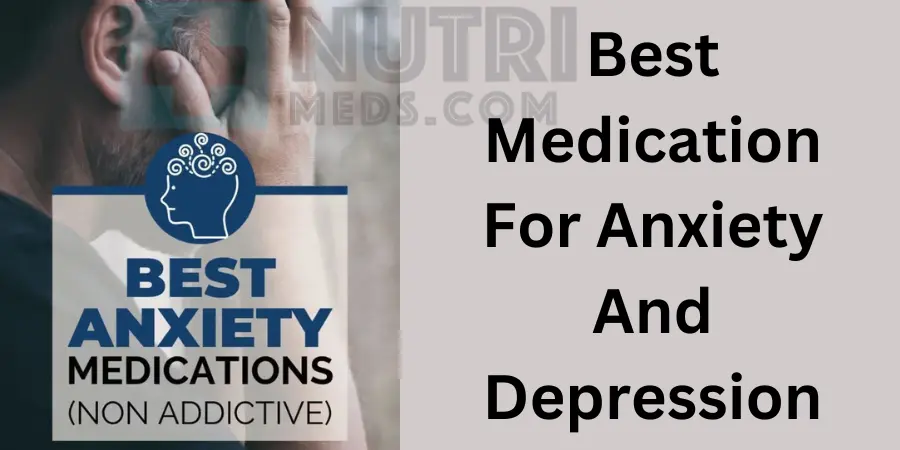- enquiry@nutrimedshop.com
- +1 848-480-6007
- Adderall
- Adipex
- Alprazolam
- Ambien
- Ativan
- Carisoprodol
- Clonazepam
- Codeine
- Darvocet
- Demerol
- Diazepam
- Dilaudid
- Fioricet
- Hydrocodone
- Hydromorphone
- Lorazepam
- Lorcet
- Lortab
- Meridia
- Methadone
- Norco
- Opana ER
- Oxycodone
- Oxycontin
- Percocet
- Phentermine
- Roxicodone
- Soma
- Suboxone
- Subutex
- Tramadol
- Valium
- Viagra
- Vicodin
- Xanax
- Klonopin
- Cialis

Best Medication For Anxiety And Depression
2025-02-17Introduction
Anxiety and depression are prevalent mental health disorders that impact millions globally. Anxiety disorders are characterized by excessive worry, fear, and apprehension that can interfere with daily life. Symptoms may include restlessness, fatigue, difficulty concentrating, irritability, and muscle tension. Depression, on the other hand, is a mood disorder marked by persistent sadness, loss of interest or pleasure, feelings of worthlessness or guilt, and changes in sleep and appetite patterns.
The prevalence of these disorders is staggering, with anxiety affecting around 284 million people globally, and depression affecting over 264 million people. The impact of these conditions on daily life can be significant, affecting relationships, work performance, and overall quality of life. Individuals with anxiety and depression may struggle to carry out routine tasks, experience social isolation, and face challenges in maintaining a healthy lifestyle.
Types of Medications for Anxiety and Depression
Medications for anxiety and depression generally fall into several main categories: selective serotonin reuptake inhibitors (SSRIs), serotonin-norepinephrine reuptake inhibitors (SNRIs), benzodiazepines, and atypical antidepressants.
SSRIs are commonly used to treat anxiety and depression. They work by increasing levels of serotonin, a neurotransmitter that regulates mood, in the brain. Examples include fluoxetine (Prozac), sertraline (Zoloft), paroxetine (Paxil), and citalopram (Celexa). SSRIs are generally well-tolerated with fewer side effects compared to older antidepressants.
SNRIs are similar to SSRIs but also affect norepinephrine levels in addition to serotonin. This dual action can make them effective for certain types of depression and anxiety disorders. Common SNRIs include duloxetine (Cymbalta), venlafaxine (Effexor), and levomilnacipran (Fetzima). They may cause more side effects like nausea, dizziness, and increased blood pressure compared to SSRIs.
Benzodiazepines are sedative medications that can provide rapid relief from anxiety symptoms by enhancing the effects of gamma-aminobutyric acid (GABA), a neurotransmitter that promotes calmness. Examples are alprazolam (Xanax), clonazepam (Klonopin), and lorazepam (Ativan). While effective for short-term anxiety relief, benzodiazepines have a high risk of dependence and are typically only recommended for short-term use.
Atypical Antidepressants don’t fit neatly into the other categories but are also used to treat anxiety and depression. This group includes bupropion (Wellbutrin), mirtazapine (Remeron), and trazodone. They work through different mechanisms than SSRIs/SNRIs and may be prescribed when other medications are ineffective or cause intolerable side effects.
SSRIs (Selective Serotonin Reuptake Inhibitors)
SSRIs are a commonly prescribed class of antidepressants that work by increasing the levels of serotonin, a neurotransmitter in the brain associated with mood regulation. They do this by blocking the reabsorption (or reuptake) of serotonin in the brain, making more of it available to transmit signals between neurons.
Some common SSRI medications include:
- Fluoxetine (Prozac)
- Sertraline (Zoloft)
- Paroxetine (Paxil)
- Citalopram (Celexa)
- Escitalopram (Lexapro)
SSRIs are generally considered effective for treating both depression and anxiety disorders, with response rates ranging from 40-70%. They can take 4-6 weeks to reach their full therapeutic effect. Common side effects include nausea, headaches, insomnia, and sexual dysfunction, though these often subside after a few weeks.
SSRIs are typically well-tolerated and have a lower risk of serious side effects compared to older antidepressants. However, they can increase the risk of suicidal thoughts and behaviors, especially in younger adults, so close monitoring is recommended when starting treatment.
SNRIs (Serotonin-Norepinephrine Reuptake Inhibitors)
SNRIs, or serotonin-norepinephrine reuptake inhibitors, are a class of medications that work by increasing the availability of two neurotransmitters in the brain: serotonin and norepinephrine. Unlike SSRIs, which primarily target serotonin, SNRIs affect both of these neurotransmitters, which are involved in regulating mood, anxiety, and other functions.
Common examples of SNRI medications include duloxetine (Cymbalta), venlafaxine (Effexor), desvenlafaxine (Pristiq), and levomilnacipran (Fetzima). These medications are primarily used to treat depression, anxiety disorders (such as generalized anxiety disorder, social anxiety disorder, and panic disorder), and certain types of chronic pain conditions, like diabetic neuropathy and fibromyalgia.
One of the potential advantages of SNRIs over SSRIs is their dual action on serotonin and norepinephrine, which may make them more effective for certain individuals, particularly those with more severe or treatment-resistant forms of depression or anxiety. Additionally, some studies suggest that SNRIs may be more effective in treating certain symptoms, such as fatigue, lack of motivation, and cognitive impairment, compared to SSRIs.
However, SNRIs also come with their own set of potential side effects, which can include nausea, dizziness, constipation, dry mouth, increased blood pressure, and increased heart rate. Some individuals may also experience more severe side effects, such as an elevated risk of bleeding, seizures, or serotonin syndrome (a potentially life-threatening condition caused by excessive serotonin levels).
It’s important to work closely with a healthcare provider to determine if an SNRI is an appropriate treatment option and to monitor for any potential side effects or interactions with other medications.
Benzodiazepines
Benzodiazepines are a class of medications primarily used for treating anxiety disorders, insomnia, and in some cases, alcohol withdrawal symptoms. They work by enhancing the effects of gamma-aminobutyric acid (GABA), a neurotransmitter that inhibits nerve transmission in the brain, producing a calming effect.
Examples of commonly prescribed benzodiazepines include:
- Alprazolam (Xanax)
- Clonazepam (Klonopin)
- Diazepam (Valium)
- Lorazepam (Ativan)
While benzodiazepines can provide rapid relief from anxiety symptoms, they are intended for short-term use due to their potential for dependence and addiction. Long-term use can lead to tolerance, where higher doses are needed to achieve the same effects, and withdrawal symptoms when the medication is discontinued abruptly.
Benzodiazepines should be used with caution, as they can cause side effects such as drowsiness, dizziness, and impaired coordination. They may also interact with other medications and substances, including alcohol, which can amplify their sedative effects.
It’s crucial to follow your doctor’s instructions carefully when taking benzodiazepines and to discuss any concerns or side effects you experience. These medications should be tapered off gradually under medical supervision to avoid potential withdrawal symptoms.
Atypical Antidepressants
Atypical antidepressants are medications that don’t fit neatly into other categories like SSRIs or SNRIs. They work differently than traditional antidepressants and are sometimes used when other medications haven’t been effective.
Bupropion (Wellbutrin) is a popular atypical antidepressant that inhibits the reuptake of dopamine and norepinephrine. It’s unique in that it doesn’t impact serotonin levels. Bupropion is often prescribed as it has a lower risk of certain side effects like weight gain and sexual dysfunction. However, it can increase anxiety in some people.
Vortioxetine (Trintellix) is a newer atypical antidepressant that works as a serotonin modulator and stimulator. It’s thought to restore serotonin levels in natural, brain-specific ways. Vortioxetine is approved to treat major depressive disorder in adults. Nausea is one of the most common side effects.
Other examples of atypical antidepressants include mirtazapine (Remeron), trazodone, and vilazodone (Viibryd). Atypical antidepressants can be effective for treatment-resistant depression when other medications haven’t provided sufficient relief. However, they also carry unique side effect profiles that require monitoring.
Factors in Choosing a Medication
Selecting the right medication for anxiety and depression involves considering several important factors. The severity of symptoms plays a crucial role, as more severe cases may require different medications or higher doses. Additionally, any existing health conditions or medications being taken must be evaluated to avoid potential interactions or complications.
Side effects are another key consideration, as different medications can have varying side effect profiles. Some common side effects of anxiety and depression medications include nausea, insomnia, weight changes, and sexual dysfunction. It’s essential to weigh the potential benefits against the possible side effects to find the most suitable option.
Cost is also a factor that can influence medication choice, as some medications may be more expensive than others, particularly if they are brand-name drugs. Insurance coverage and out-of-pocket expenses should be taken into account when selecting a medication.
Ultimately, it’s crucial to work closely with a healthcare professional, such as a psychiatrist or physician, who can provide guidance based on your specific situation. They can assess your symptoms, medical history, and personal preferences to recommend the most appropriate medication and dosage. Regular follow-ups and adjustments may be necessary to ensure the medication is working effectively and to monitor for any side effects or concerns.
Medication Effectiveness and Compliance
Medication effectiveness and compliance are crucial factors in managing anxiety and depression. While prescription drugs can be highly effective, their success rates vary, and adherence to the prescribed regimen is essential for optimal outcomes.
Success rates for anxiety and depression medications can range from 50% to 70%, depending on the specific condition and the medication prescribed. It’s important to note that these medications may not work for everyone, and finding the right medication or combination of medications may require patience and close collaboration with a healthcare provider.
Compliance, or taking the medication as prescribed, is vital for achieving the desired therapeutic effects. Skipping doses, taking incorrect amounts, or stopping the medication abruptly can diminish its effectiveness and potentially lead to withdrawal symptoms or a relapse of symptoms. It’s crucial to follow the prescribed dosage and timing instructions carefully.
Managing side effects is another essential aspect of medication compliance. Many anxiety and depression medications can cause side effects, such as nausea, drowsiness, dry mouth, or sexual dysfunction. While these side effects are often mild and temporary, they can sometimes be bothersome enough to discourage patients from continuing their treatment. Open communication with healthcare providers is essential to address side effects and explore strategies for managing them, such as adjusting dosages, changing medications, or implementing lifestyle modifications.
Combining Medication with Therapy
Combining medication with psychotherapy, particularly cognitive-behavioral therapy (CBT), is often considered the gold standard treatment approach for anxiety and depression. This integrated approach targets both the biological and psychological aspects of these conditions, leading to better outcomes and long-term management.
The benefits of combining medication and therapy include:
- Improved Symptom Relief: While medication can alleviate physical symptoms like fatigue, insomnia, and restlessness, therapy helps address negative thought patterns, unhealthy behaviors, and emotional challenges. Together, they provide comprehensive symptom relief.
- Increased Treatment Effectiveness: Research shows that the combination of medication and CBT is more effective than either treatment alone for moderate to severe cases of anxiety and depression.
- Better Relapse Prevention: CBT equips individuals with coping strategies and problem-solving skills, reducing the risk of relapse after discontinuing medication.
- Addressing Underlying Issues: Therapy helps identify and address the root causes of anxiety and depression, such as traumatic experiences, relationship problems, or negative core beliefs.
Common combinations include:
- SSRIs (e.g., fluoxetine, sertraline) + CBT: This combination is widely used for treating depression, anxiety disorders, and OCD.
- SNRIs (e.g., duloxetine, venlafaxine) + CBT: Effective for treating depression, anxiety disorders, and chronic pain conditions.
- Benzodiazepines (e.g., clonazepam, lorazepam) + CBT: Often used for short-term management of severe anxiety or panic attacks, while CBT provides long-term coping strategies.
By addressing both the biological and psychological aspects of anxiety and depression, combining medication with therapy can lead to improved quality of life, better symptom management, and a higher likelihood of achieving remission.
Lifestyle Changes to Support Treatment
In addition to medication, making positive lifestyle changes can greatly improve the management of anxiety and depression. A holistic approach that combines medication with healthy habits can significantly enhance overall well-being and promote better mental health.
Diet: A nutritious, well-balanced diet can have a profound impact on mood and brain function. Include a variety of fruits, veggies, whole grains, lean proteins, and healthy fats in your diet. Avoid processed foods, excessive sugar, and caffeine, as these can exacerbate symptoms.
Exercise: Regular physical activity has been shown to boost mood, reduce stress, and improve sleep quality. Try to get 30 minutes of moderate exercise like brisk walking, swimming, or cycling on most days of the week. Exercise releases endorphins, which are natural mood elevators.
Sleep: Adequate sleep is crucial for mental health. Aim for 7-9 hours of quality sleep each night. Establish a consistent sleep routine, create a relaxing bedtime routine, and ensure your sleeping environment is cool, dark, and quiet.
Stress Management: Chronic stress can worsen anxiety and depression symptoms. Practice stress-reducing techniques like deep breathing exercises, meditation, yoga, or mindfulness. Engaging in enjoyable hobbies, spending time in nature, and prioritizing self-care can also help manage stress levels.
Remember, it may take time to find the right combination of medication and lifestyle changes that work best for you. Be patient, and consistent, and work closely with your healthcare provider to optimize your treatment plan.


